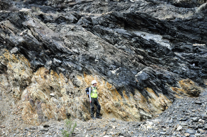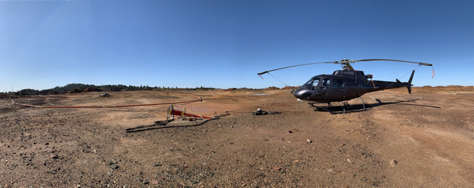Published: July 31, 2019
European Union-funded INFACT project is a step closer to set a first-of-its-kind “reference sites” for non-invasive mineral exploration technologies by testing the methodology in Spain, Finland and Germany.
The so-called “Horizon 2020” project, which recently collected a set of new geoscience data through airborne electromagnetic (AEM) surveys in southern Spain, is looking at two main aspects of exploration technologies:
- Technical performance: how a technology contributes to the discovery of a new deposit;
- Socio-environmental: what is the impact of a technology on the environment and how is it perceived by the local community.
Airborne electromagnetics (AEM) is a non-invasive mineral exploration technique that minimizes the environmental impact related to exploration activities, that can detect variations in the electrical conductivity of rocks, sediments and waters to a depth of several hundred meters.
The INFACT consortium conducted a series of AEM surveys across Europe between summer 2018 and April 2019. The recent surveys in Spain were led by Geotech Ltd., in collaboration with Atalaya Mining, Cobre Las Cruces, Aarhus Geophysics, Geognosia, and coordinated by the Helmholtz Institute Freiberg for Resource Technology.
In the coming months, the AEM data will be integrated with other datasets collected in order to build a strong knowledge of the under-cover geology.
Social perception of mineral exploration
INFACT partners have developed a stakeholder engagement process based on preliminary scientific research on social acceptance of mining and mineral exploration for different social contexts: The European Union as a whole, and the INFACT reference countries — Finland, Germany and Spain.
 Across those three countries, local residents and national stakeholders were informed, consulted, or invited to collaborate in the exploration campaign, building thus trust around the project’s activities.
Across those three countries, local residents and national stakeholders were informed, consulted, or invited to collaborate in the exploration campaign, building thus trust around the project’s activities.
In Spain, two public events were organized nearby the reference area in Andalusia, inviting high-school students to follow live the geoscience data acquisition.
Beyond the student engagement activities, the INFACT team met with professionals from the mining and exploration sector, representatives of regional institutions, and representatives from the International University of Andalusia.
Data collected during the project lifetime will be consultable by the public and displayed on an online interactive platform.
For the full press release click here.
